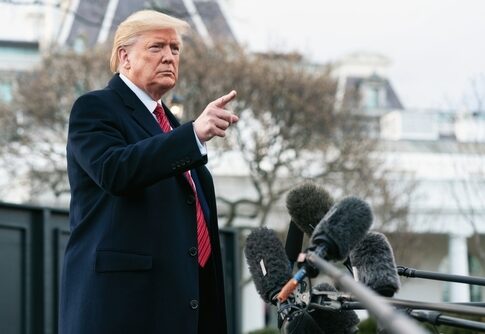President Trump’s sweeping new tariff policy has ignited a significant rift within the Republican Party. With markets tumbling and recession fears mounting, several high-profile Republicans are breaking ranks to oppose what former Vice President Mike Pence dubbed “the largest peacetime tax hike in U.S. history.” How would restoring congressional control over tariffs change America’s trade negotiation position?
Republican Divide Over Trump’s Sweeping Tariffs
President Trump’s announcement of a 10% baseline tariff on all imports, with higher rates targeted at specific countries, has triggered a rare instance of Republican resistance to the president’s economic policies. The market response was immediate and severe, with significant drops in major indices as investors processed potential implications for global trade and domestic prices.
Senator Thom Tillis of North Carolina has emerged as a key figure in this growing resistance, expressing particular concern about the impact on American farmers. “Anyone who says there may be a little bit of pain before we get things right needs to talk to my farmers who are one crop away from bankruptcy,” Tillis stated, highlighting the vulnerability of agricultural constituencies.
1) 1996 Nancy Pelosi encourages all of Congress to back reciprocal tariffs
2) 2008 Bernie Sanders wants tariffs, says jobs are going overseas
3) 2018 Barack Obama calls for reciprocal tariffs
4) 1988 Donald Trump says foreign countries must pay tariffs
Only 1 hasn’t sold out pic.twitter.com/6jqXqaYALC
— Wall Street Apes (@WallStreetApes) April 4, 2025
Bipartisan Legislative Challenge Takes Shape
Senators Chuck Grassley and Maria Cantwell have introduced legislation aimed at reasserting congressional authority over tariff policies. The bill would establish a 60-day window for Congress to approve new tariffs and grant legislators the power to terminate trade measures at any time.
This legislative effort builds upon previous resistance when four Republican senators joined Democrats in a symbolic vote against Trump’s national emergency declaration used to justify tariffs. However, the path forward remains challenging, particularly in the House, where Speaker Mike Johnson has blocked similar votes and implemented rules preventing Democrats from forcing floor consideration.
🚨 #BREAKING: President Trump just officially signed the order mandating reciprocal tariffs across the board
America WILL NO LONGER be taken advantage of by every country on the planet!
We’re back! 🇺🇸
🎥 @MargoMartin47 pic.twitter.com/vCaIJxE4Nv
— Nick Sortor (@nicksortor) April 2, 2025
High-Profile Republican Criticism Mounting
Former Senate leader Mitch McConnell delivered a pointed critique of the tariff strategy, warning about broader economic consequences. “Make no mistake: Goods made in America will be more expensive to manufacture and, ultimately, for consumers to purchase, with higher broad-based tariffs,” McConnell cautioned, adding that Americans already “tightening their belts” would face additional financial pressure.
Former Vice President Mike Pence joined the chorus of Republican critics, characterizing the tariffs as “the largest peacetime tax hike in U.S. history.” Trump has defended his policy on Truth Social, arguing that the measures would ultimately strengthen the American economy despite immediate market reactions and criticism from within his party.

